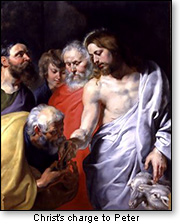Jesus' first recorded words of preaching were "Repent ye, and believe the gospel" (Mark 1:15).
There is no more important message for America today as our nation moves inexorably — by all appearances — toward calamity and God's judgments, as a result of our reliance on ourselves, rather than on Him.
 God is real — and so is our need to turn to Him to preserve our republic and ensure we are kept free: free to worship Him, free to seek His will for our nation, free to live our lives in harmony with His teachings, free to exist without unjust oppression or control by others.
God is real — and so is our need to turn to Him to preserve our republic and ensure we are kept free: free to worship Him, free to seek His will for our nation, free to live our lives in harmony with His teachings, free to exist without unjust oppression or control by others.
As we watch our nation's moral and political strength dissipate and our options for turning things around become fewer and fewer, we should ask ourselves: what can I personally do that would make the most difference for the good of America?
If we believe God's word, the most important thing we could do for our country, and for ourselves, for that matter, is to become converted to Jesus Christ and thereafter order our lives — our priorities, pursuits, allegiances, behavior, and thinking — upon to that conversion.
Let's examine what that means.
Two versions of salvation
All persons seek "salvation" — in some form or another — even if defined in purely secular terms. Salvation could be considered personal triumph over those things that vex us: our adversaries, detractors, obstacles, weaknesses, challenges, threats. To be "saved" is to be rescued from such things. For many people, this means "rescuing themselves" by their own wits.
To Christians, however, salvation means something quite different, something unattainable by human effort alone. It consists in overcoming human nature itself and becoming "partakers of the divine nature" (2 Pet. 1:4) — through the atonement and grace of Jesus Christ, and not through "self-improvement" or self-reliant "works." It means surrendering our will to God, and receiving through Him a renewed heart and mind and the hope of eternal life — thus being rescued from our fallen condition and becoming "reconciled" to God, capable of doing those things that truly please, glorify, and exemplify Him.
The future of our nation hinges on which version of salvation most Americans genuinely believe in — as revealed by their actions in the face of the severe tests and trials that surely await our country.
A matter of conversion
If we care about our country, we would do well to contemplate: Can our nation be saved from its enemies, foreign and domestic, in these difficult times if significant numbers of Americans are not first willing to honor Jesus Christ and seek their own personal salvation on His terms, by living His scriptural gospel?
Put another way —
Despite America's military, economic, or political strength at any given time, can our republic survive without divine intervention resulting from the righteousness of its people?
The answers to such questions are clear to anyone familiar with the teachings of the Bible — and also familiar with the clever designs and deceptions of the Adversary, who attempts constantly to corrupt and destroy whatever we might undertake to do. No amount of human ingenuity will preserve our nation if we are not, individually and collectively, faithful subjects of the Creator, worthy of His Providence.
As our Founders understood well, the very security and future of our nation are dependent mainly on the "virtue of the people" — that is, the degree to which we respect and obey God.
 This leads us to take a look at the terms upon which God is willing to accept our profession of faith in Him. What do the scriptures say about conversion to Jesus Christ?
This leads us to take a look at the terms upon which God is willing to accept our profession of faith in Him. What do the scriptures say about conversion to Jesus Christ?
The biblical definition of conversion
Jesus told Peter, "When thou art converted, strengthen thy brethren" (Luke 22:32, emphasis added). He also taught his disciples, "Except ye be converted, and become as little children, ye shall not enter into the kingdom of heaven" (Matt. 18:3, emphasis added).
Jesus elaborated, "Whosoever therefore shall humble himself as this little child, the same is greatest in the kingdom of heaven" (Matt. 18:4).
On the day of Pentecost — during which the apostles were "filled with the Holy Ghost" — Peter instructed a group of onlookers who were amazed at the healing of a lame man:
-
Repent ye therefore, and be converted, that your sins may be blotted out, when the times of refreshing shall come from the presence of the Lord. (Acts 3:12, 19, emphasis added)
According to the dictionary, "conversion" means literally to "turn around." It means "to change into a different form, substance, or state."
In the Bible, the idea of conversion is best described by the term "born again." We read the following discussion of this doctrine in John, chapter 3:
-
There was a man of the Pharisees, named Nicodemus, a ruler of the Jews:
The same came to Jesus by night, and said unto him, Rabbi, we know that thou art a teacher come from God: for no man can do these miracles that thou doest, except God be with him.
Jesus answered and said unto him, Verily, verily, I say unto thee, Except a man be born again, he cannot see the kingdom of God.
Nicodemus saith unto him, How can a man be born when he is old? can he enter the second time into his mother's womb, and be born?
Jesus answered, Verily, verily, I say unto thee, Except a man be born of water and of the Spirit, he cannot enter into the kingdom of God.
That which is born of the flesh is flesh; and that which is born of the Spirit is spirit.
Marvel not that I said unto thee, Ye must be born again.
The wind bloweth where it listeth, and thou hearest the sound thereof, but canst not tell whence it cometh, and whither it goeth: so is every one that is born of the Spirit. (verses 1-8, emphasis added)
Jesus then explained further how such conversion is possible, in response to the skepticism of his questioner:
-
Nicodemus answered and said unto him, How can these things be?
Jesus answered and said unto him, Art thou a master of Israel, and knowest not these things?...
[A]s Moses lifted up the serpent in the wilderness, even so must the Son of man be lifted up:
That whosoever believeth in him should not perish, but have eternal life.
For God so loved the world, that he gave his only begotten Son, that whosoever believeth in him should not perish, but have everlasting life.
For God sent not his Son into the world to condemn the world; but that the world through him might be saved.
He that believeth on him is not condemned: but he that believeth not is condemned already, because he hath not believed in the name of the only begotten Son of God.
And this is the condemnation, that light is come into the world, and men loved darkness rather than light, because their deeds were evil.
For every one that doeth evil hateth the light, neither cometh to the light, lest his deeds should be reproved.
But he that doeth truth cometh to the light, that his deeds may be made manifest, that they are wrought in God. (verses 9-21, emphasis mine)
 From these challenging words, we learn many things about genuine conversion to Christ, or to God.
From these challenging words, we learn many things about genuine conversion to Christ, or to God.
We learn that in order to have God's Spirit with us in any significant measure, so that we might emulate Jesus, we must first be spiritually reborn — or "born of the Spirit" — thus becoming susceptible to the light of truth, capable of perceiving and following the will of God in a way as spontaneous and natural as the movements of the wind. Only as we experience such true conversion can we consider ourselves assured of eternal life — meaning, possessing the kind of godly, spiritual life that Jesus came to earth to make possible. (See John 4:13-14; 6:27, 35; 10:10; 14:7.)
For, as the scriptures teach, only as we are regenerated through the blood and atonement of Christ can we truly be "saved."
We also learn from the above verses that those who "doeth truth" ultimately find their way to such conversion.
Our dilemma
To understand why we need such "salvation," of course, we need to accept the fact that we are "fallen," through sin, and thus in need of "reconciliation with God" (see Rom. 5:8-12, 2 Cor. 5:17-21). Hence the need for a Savior, through whose sacrifice we might overcome our fallen condition and become a "new creature" — a person whose heart and mind are fundamentally changed.
Said Paul,
-
Therefore if any man be in Christ, he is a new creature: old things are passed away; behold, all things are become new.
And all things are of God, who hath reconciled us to himself by Jesus Christ, and hath given to us the ministry of reconciliation;
To wit, that God was in Christ, reconciling the world unto himself, not imputing their trespasses unto them; and hath committed unto us the word of reconciliation.
Now then we are ambassadors for Christ, as though God did beseech you by us: we pray you in Christ's stead, be ye reconciled to God.
For he hath made him to be sin for us, who knew no sin; that we might be made the righteousness of God in him. (2 Cor. 5:17-21, emphasis mine)
To reiterate — to come unto Christ, to be reconciled to God, and to overcome our natural inclination to sin (our "fallen nature"), we must become a new creature, one for whom "old things are passed away," for whom "all things become new."
This kind of conversion isn't transitory or fleeting. If it is to be real, then it must be fundamental, transcendent, enduring, even "eternal" for those who have attained it — as evidenced by their fulfillment of the following words of Jesus:
-
But he that shall endure unto the end, the same shall be saved. (Matt. 24:13, emphasis added)
Attaining conversion
 With the above understanding of the need to be reclaimed from our fallen condition (in which we are prone naturally to sin) — so that we might thereafter, as Paul wrote in Romans 6, be "free from sin, and become servants to God" (verse 22), "walk[ing] in newness of life" (verse 4), imperfect but acceptable to God because our hearts have been changed — the question arises: how can we attain such abundance of life, for real, not in a way that is pretended, imagined, or temporary, and thus be a light and strength to others? (See Matt. 5:13-16, as well as Luke 22:32.)
With the above understanding of the need to be reclaimed from our fallen condition (in which we are prone naturally to sin) — so that we might thereafter, as Paul wrote in Romans 6, be "free from sin, and become servants to God" (verse 22), "walk[ing] in newness of life" (verse 4), imperfect but acceptable to God because our hearts have been changed — the question arises: how can we attain such abundance of life, for real, not in a way that is pretended, imagined, or temporary, and thus be a light and strength to others? (See Matt. 5:13-16, as well as Luke 22:32.)
In the Sermon on the Mount, Jesus cautioned all of us with these words: "[S]trait is the gate, and narrow is the way, which leadeth unto life, and few there be that find it" (Matt. 7:13-14, emphasis mine).
No elitist, Jesus is not saying that He is withholding from any person His invitation to come unto Him and be saved — but He is emphasizing that true conversion does not come lightly. As the scriptures clearly teach, the price of salvation is whole-hearted submission to God, nothing held back, as James taught:
-
...Wherefore..., God resisteth the proud, but giveth grace unto the humble.
Submit yourselves therefore to God. Resist the devil, and he will flee from you.
Draw nigh to God, and he will draw nigh to you. Cleanse your hands, ye sinners; and purify your hearts, ye double minded....
Humble yourselves in the sight of the Lord, and he shall lift you up....
Whereas ye know not what shall be on the morrow. For what is your life? It is even a vapour, that appeareth for a little time, and then vanisheth away.
For that ye ought to say, If the Lord will, we shall live, and do this, or that. (James 4:6-8, 10, 14-15, emphasis added)
Similarly, in Romans 10:3, we read, "For they being ignorant of God's righteousness, and going about to establish their own righteousness, have not submitted themselves unto the righteousness of God."
Jesus Himself says in Matt. 22 — when asked, "Master, which is the great commandment in the law":
-
...Thou shalt love the Lord thy God with all thy heart, and with all thy soul, and with all thy mind.
This is the first and great commandment. (verses 37 and 38, emphasis added)
Obviously, the commandment to love God with all our heart, mind, and soul requires not only putting Him first in our lives, but yielding our entire will to Him — to the extent we can find in our heart the sincerity and honesty to do so.
As Jesus taught in Matt. 18:3, the measure of such yielding is the degree to which we "become as little children" in our faith and our submissiveness to God.
No pretense
 This brings us back to the Sermon on the Mount.
This brings us back to the Sermon on the Mount.
-
Not every one that saith unto me, Lord, Lord, shall enter into the kingdom of heaven; but he that doeth the will of my Father which is in heaven.
Many will say to me in that day, Lord, Lord, have we not prophesied in thy name? and in thy name have cast out devils? and in thy name done many wonderful works?
And then will I profess unto them, I never knew you: depart from me, ye that work iniquity.
Therefore whosoever heareth these sayings of mine, and doeth them, I will liken him unto a wise man, which built his house upon a rock:
And the rain descended, and the floods came, and the winds blew, and beat upon that house; and it fell not: for it was founded upon a rock.
And every one that heareth these sayings of mine, and doeth them not, shall be likened unto a foolish man, which built his house upon the sand:
And the rain descended, and the floods came, and the winds blew, and beat upon that house; and it fell: and great was the fall of it. (Matt. 7:21-27, emphasis added)
The test of our conversion is its permanence — its endurance. The "proof" that we have been truly converted to Christ, born again, made a "new creature," reconciled to God, or otherwise redeemed from our fallen nature is our ability to stay the course of a converted disciple, as Paul wrote to Timothy:
-
I have fought a good fight, I have finished my course, I have kept the faith:
Henceforth there is laid up for me a crown of righteousness, which the Lord, the righteous judge, shall give me at that day: and not to me only, but unto all them also that love his appearing. (2 Tim. 4:7-8)
This kind of proven discipleship should be the goal of every professing Christian. Anything less — no matter our station — will prove futile and vain "at that day" when we are weighed in the balance.
A word about baptism
So far, we've focused on the inward submission of our will to Jesus Christ — and the spiritual changes that result when this surrender is authentic — in defining what it means to be converted to Christ.
The reason for this emphasis should be clear. According to the scriptures, God will accept the offering of our will — that is, our heart — only if it is given fully, without pretense, as displayed by the kind of life we live after our professed conversion. (See Deut. 4:29, Matt. 5:8, Rom. 10:9-10, Heb. 4:12-13, and James 4:8.) On that premise — at least in principle — all Bible-believing Christians should be able to agree.
 This unifying point of doctrine, however, is not meant to ignore the need for water baptism, a doctrine emphasized throughout the New Testament as essential to salvation.
This unifying point of doctrine, however, is not meant to ignore the need for water baptism, a doctrine emphasized throughout the New Testament as essential to salvation.
Indeed, in His words to Nicodemus, Jesus declared, "Except a man be born of water and of the Spirit, he cannot enter into the kingdom of God" (John 3:5) — a passage generally understood to require water baptism, as well as spiritual rebirth.
Unfortunately, because of water baptism's practical implications — involving such issues as authority (formal vs. informal), manner (immersion vs. sprinkling), timing ("age of accountability" vs. newly born), preconditions (evidence of repentance vs. no evidence of repentance), and so forth — discussion of baptism introduces a number of "institutional" issues that tend to divide Christians. Indeed, differences regarding baptism are among the most fundamental distinctions between the various Christian denominations.
That said, let's accept unequivocally the following words of Jesus Himself:
-
He that believeth and is baptized shall be saved; but he that believeth not shall be damned. (Mark 16:16, emphasis mine)
Meanwhile, we'll leave to each individual believer in Christ the fine points of the question of baptism — including the possibility of whether it can be fulfilled inwardly alone, without outward ritual — as the believer seeks to follow the admonition of Paul to "work out your own salvation with fear and trembling" (Phil. 2:12).
Fruit
One of the recurring themes of the scriptures is the idea of "bearing fruit," and in the same section of the Sermon on the Mount cited above, Jesus stresses this basic doctrine. In verses 16 through 20 of Matthew 7, He says,
-
Ye shall know them by their fruits. Do men gather grapes of thorns, or figs of thistles?
Even so every good tree bringeth forth good fruit; but a corrupt tree [that is, an unconverted one] bringeth forth evil fruit.
A good tree cannot bring forth evil fruit, neither can a corrupt tree bring forth good fruit.
Every tree that bringeth not forth good fruit is hewn down, and cast into the fire.
Wherefore by their fruits ye shall know them. (emphasis mine)
 ...God anointed Jesus of Nazareth with the Holy Ghost and with power: who went about doing good, and healing all that were oppressed of the devil; for God was with him. (Acts 10:38)
...God anointed Jesus of Nazareth with the Holy Ghost and with power: who went about doing good, and healing all that were oppressed of the devil; for God was with him. (Acts 10:38)
With His example as our model, we should remember that Jesus taught:
-
He that abideth in me, and I in him, the same bringeth forth much fruit: for without me ye can do nothing.
If a man abide not in me, he is cast forth as a branch, and is withered; and men gather them, and cast them into the fire, and they are burned.
If ye abide in me, and my words abide in you, ye shall ask what ye will, and it shall be done unto you.
Herein is my Father glorified, that ye bear much fruit; so shall ye be my disciples. (John 15:5-8, emphasis added)
It was on the basis of such whole-souled conversion that Jesus likened the converted in the parable of the sower to "good ground":
-
But he that received seed into the good ground is he that heareth the word, and understandeth it; which also beareth fruit, and bringeth forth, some an hundredfold, some sixty, some thirty. (Matt. 13:23, emphasis added)
It's instructive to add Luke's rendering of the same teaching of Jesus about those who are truly converted, for it emphasizes the terms upon which we are saved:
-
But that on the good ground are they, which in an honest and good heart, having heard the word, keep it, and bring forth fruit with patience. (Luke 8:15, emphasis added)
Significance
Why such explicit religious focus in the context of "saving America"? Because reliance upon God — and living worthy of his intervention — is the best, and ultimately only, hope for the future of our embattled nation.
We stand to lose the culture war, the war on terror, the political war for the future of our country, and the prospect of passing on to our posterity the blessings of liberty unless we as a nation submit ourselves individually to God and seek his intervention and guidance in the affairs of our country.
That's how we started, of course. Our great Declaration of Independence — by which our forbears risked their lives and fortunes for our sakes — was premised on the following:
-
We, therefore, the Representatives of the united States of America, in General Congress, Assembled, appealing to the Supreme Judge of the world for the rectitude of our intentions....
And for the support of this Declaration, with a firm reliance on the protection of divine Providence,...mutually pledge to each other our Lives, our Fortunes, and our sacred Honor. (emphasis mine)
In these sobering times, we can afford to do no less than they.
Indeed, without the same "firm reliance on the protection of divine Providence" that our forbears exhibited, which "hath made and preserv'd us a nation" (the National Anthem), our best efforts will prove powerless against our current and future foes.
That is the sobering reality — and challenge — facing all concerned Americans in these perilous times.
© Stephen Stone
